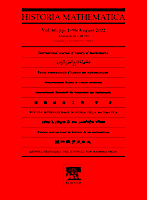Christine Proust, E. Vandendriessche, (Eds)
“The present special issue of Historia Mathematica draws on several disciplinary perspectives in order to critically analyze the historiographical opposition between “concrete numbers” and “abstract numbers”. Some historians, philosophers, anthropologists or researchers in education have theorized a separation between “numbers” and the entities enumerated or counted with these numbers, and more particularly, between numbers and measurement units attached to them in the expression of measurement values. To what extent does this separation reflect on the practices carried out in societies or social groups under scrutiny by these scholars ? How has the notion of “abstract numbers” – as opposed to those described as “concrete numbers” – shaped the history of numerations ?
The papers in this special issue confront common historiography with the great diversity of numeration and measurement systems attested to by the various textual and ethnographic sources available to us. This volume shows how a conceptualization of numbers consisting in isolating numbers from their context of practice, gave rise to a linear history of oral and written numerations rooted in evolutionary theories and classifications. ”
The papers in this special issue confront common historiography with the great diversity of numeration and measurement systems attested to by the various textual and ethnographic sources available to us. This volume shows how a conceptualization of numbers consisting in isolating numbers from their context of practice, gave rise to a linear history of oral and written numerations rooted in evolutionary theories and classifications. ”
: : Historia Mathematica n°59, special issue
: : May 2022, 217 pp.
: : Language : English
TABLE OF CONTENTS
- Introduction - A critical approach to the opposition between “concrete” and “abstract” numbers, Christine Proust and Eric Vandendriessche
- Part I What is concrete in “concrete numbers” ?
– The concrete numbers of “primitive” societies : A historiographical approach, Eric Vandendriessche
– Numeracy at the dawn of writing : Mesopotamia and beyond, Miguel Valério and Silvia Ferrara
– The sexagesimal place-value notation and abstract numbers in mathematical cuneiform texts, Christine Proust
- Part II Working on numbers with and without measurement units
– Measuring crops with the šukunnûm-number, Baptiste Fiette
– On the history of units in French elementary school arithmetic : The case of proportionality, Christine Chambris and Jana Visnovska
- Part III Complex and denominate numbers
– “Complex numbers” and the problem of multiplication between quantities, Débora Ferreira and Gert Schubring
– How Jean-Baptiste Delambre read ancient Greek arithmetic on the basis of the arithmetic of “complex numbers” at the turn of the 19th century, Xiaofei Wang
– “Denominate numbers” in mathematics school textbooks by Stefan Banach, Karolina Karpińska
Dans la même rubrique :
- Averroès, Dieu et la connaissance du monde
- Écrits d’histoire et de philosophie des sciences
- Demain, la veille
- TECHNOCRATISME. LES GRANDS CORPS À LA DÉRIVE
- Epicureanism and Scientific Debates. Antiquity and Late Reception
- Géométrie et philosophie des mathématiques au Xe siècle - Œuvre mathématique d’al-Sijzī. Volume II
- Infini et Disproportion Chez Pascal
- L’Éclectisme dans la pensée philosophique et médicale des XVIIIe et XIXe siècles
- Savoirs profanes dans les ordres mendiants en Italie (XIIIe-XVe siècles)
- Le monde mathématique. Marco Trevisano et la philosophie dans la Venise du Trecento
- Indigenous Knowledge and Ethnomathematics
- Cultures of Computation and Quantification in the Ancient World.
- The Place of Archimedes in World History : Arguments and Counterarguments.
- Éthique et économie dans les philosophies anciennes
- Un regard sur les élites françaises : l’institut Auguste-Comte
- Concrete Numbers versus Abstract Numbers
- Companion to the Reception of Pythagoras and Pythagoreanism in the Middle Ages and the Renaissance
- De sex inconvenientibus. Traité anonyme de philosophie naturelle du XIVe siècle
- La (Re)construction française de l’analyse infinitésimale de Leibniz 1690-1706
- L’intellect. Compendium du livre De l’âme




